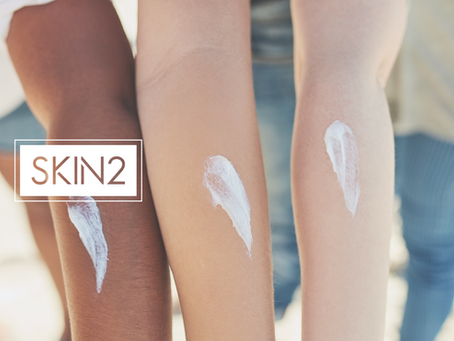SPF Uncovered but your Skin Shouldn't Be
Every Skincare specialist has had the same recurring nightmare. Your client comes in and settles themselves in your chair. You laugh and joke and quiz them on their latest Netflix watches. You ask in passing which SPF product they use, to which they reply:
“Oh, I don’t use suncream that often, I don’t burn.”
You try not to recoil visibly. Instead, you take a long, hard look at your client’s skin. Their face is a map of fine lines, sun spots and premature ageing. “How often do you use SPF?” You ask again, this time with a touch of sadness in your voice. “Oh,” they say sheepishly, “I don’t really use it that often.”
It’s a complicated conversation to have, but it’s one that we, as skincare professionals, need to have with our clients on a regular basis. Of course, SPF is the single most important product in our arsenal when it comes to protecting our skin from the sun. But for some reason, it’s also the most commonly neglected.
There are many myths about SPF, and today we’re going to bust a few of them. Hopefully, by the end of this post, you’ll be as passionate about it as we are!
Myth # one: "I don't need SPF because I don't burn."
Wrong! Just because you don’t burn doesn’t mean you’re not getting damage from the sun. Unfortunately, most of the damage we see daily is from people who think they ‘don’t burn’.
When it comes to sun exposure, there is no such thing as a “safe” amount. Just a few minutes in the sun can cause damage to your skin, and that damage accumulates over time. In addition, the power of the sun’s UV rays means that even if you only spend a little time exposed, you’re still at risk of developing skin cancer later in life.
Myth # two: "I only need suncream at the beach."
It’s a sunny day, and you want to go out and enjoy the weather. However, you might feel tempted to forgo sunscreen in favour of a quick exit. After all, you’re only going to be outside for a little while, right?
WRONG. Sun exposure is dangerous no matter how long you’re outside, and it’s essential to protect your skin at all times. Even if you’re only popping into the shops, you should be wearing SPF. The sun’s rays are just as strong (if not stronger) during winter as they are during summer.
Myth # three: "I don't like how it feels on my skin."
We get it; suncreams and SPFs can be greasy and thick, and sometimes it feels like you’re suffocating your skin. But trust us when we say that the alternative is much worse.
There are so many fantastic sunscreen formulas on the market these days – particularly when you look at the medical-grade options. There will be an SPF that works for you. Please scroll down to the bottom of our blog for our SPF recommendations.
Myth # four: "I don't need sunscreen because I have dark skin."
This myth is something that we need to address urgently. Having a darker complexion doesn’t mean you’re not susceptible to sun damage, and people with darker skin tones are more likely to develop hyperpigmentation from sun exposure.
Further to this, SPFs also boasts a range of benefits that can improve the appearance of skin. Some of the most noteworthy factors are a slower ageing process, Prevention of skin discolouration Reduction in skin inflammation, and a reduction in acne and rosacea breakouts, which can be stimulated by the sun. As a result, it is so important to use sunscreen daily, regardless of your skin tone.
Myth # five: "Sunscreen is bad for the environment."
Coral reefs provide a home for a multitude of species as well as stabilise the sea floor, preventing coastal erosion and contributing to the mitigation of climate change. These reefs are an integral part of our ecosystem, and we will be the first to admit that, sadly, a significant factor in their demise is our suncream choices.
However, there are plenty of eco-friendly sunscreen options out there. Look for sunscreens that contain zinc oxide or titanium dioxide, as these ingredients have a lower risk of causing coral bleaching.
At SKIN2, we recommend medical-grade skincare products that are safe for your skin and the environment. We recommend looking for reef-safe sunscreens, specifically formulated to be gentle on coral reefs and other marine life. When choosing a sunscreen, always check the label to see if it’s biodegradable and free from ingredients that could harm aquatic organisms.
Myth # six: "A little goes a long way."
A key topic we recently touched on in a social post is how much SPF you should apply. Whatever you think the answer is, the actual amount is likely a lot more. In our experience, the majority do not use enough SPF, which results in not only unflattering tan lines but also premature ageing and painful sunburns that ruin your day.
So what IS the correct amount? We recommend following the two-finger rule. This means applying enough SPF to cover two fingers.
Our Recommendations:
We strongly believe that our clients should never settle for second best. Everyone deserves SPFs that tick all of their boxes. Your SPF shouldn’t be sticky, leave a film or compromise your ethical values. In fact, not only does a quality SPF helps to protect your skin from the sun’s harmful UV rays, but it can also improve the appearance and texture of your skin.
Dermatologists recommend using a sunscreen with an SPF of at least 30, which blocks 97% of the sun’s UVB rays. Whilst we recommend SPF50- a higher protection factor that doesn’t irritate the skin, it is important to note that no factor can block 100% of the sun’s rays.
Our three top SPF recommendations contain high-quality ingredients, which means you’ll need to reapply them far less frequently than off-the-shelf brands:
1) OBAGI TINTED SKIN SHADE SPF 50
2)ALTRUIST ANTI-REDNESS & PIGMENTATION SPF50 50ML
3) SKINBETTER SCIENCE Sunbetter® TONE SMART SPF50 Sunscreen Compact 12g
We love these products as they:
- Dry with a sheer matte finish Suitable for all skin types
- Are Non-pore clogging
- Are allergy & dermatologist tested
- Are Fragrance-free
- Are Made without parabens
Applying SPF might seem like a hassle, but trust us when we say it’s worth it in the long run. Your skin will thank you for it! So next time you’re heading out into the sun, make sure to slather on the SPF (and a high-quality one)!
To discuss your SPF options, email the clinic directly at [email protected].

